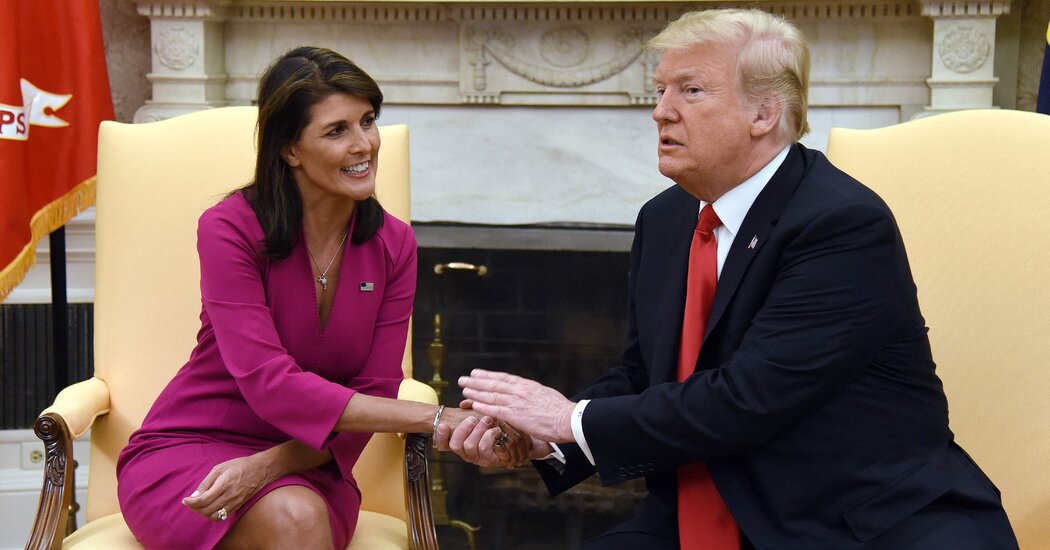
Donald J. Trump is still leading in the race for the Republican nomination.
By a lot.
In the latest New York Times/Siena College poll Wednesday, he holds a 64-11 lead over Nikki Haley, with Ron DeSantis in third place at 9 percent.
Does the poll provide any indication that Ms. Haley or a criminal trial will bring Mr. Trump down, as our headline asks?
No, but given the latest news, let’s look at it anyway.
Legal issues
With Mr. Trump leading his nearest rival by more than 50 points, it will probably take something unprecedented for him to lose the nomination.
But all year, there has been something unprecedented looming over the race: Mr. Trump’s legal problems. Tuesday night, the Colorado Supreme Court ruled Mr. Trump was ineligible to serve as president under the 14th Amendment. That’s unprecedented. And so is the coming trial and possible conviction of Mr. Trump, right in the heart of the Republican primary season.
I know you’re all wondering about the Colorado case, but our poll was concluded before the Colorado ruling and so we couldn’t ask people about it. Realistically, Mr. Trump will argue that the decision is only the latest example of the legal system treating him unfairly, and Republican voters will probably rally to his side, as they have done so many times before. If the Supreme Court decides that he remains eligible, it will be yet another victory in the eyes of many Republican primary voters. If the court concludes he’s ineligible, well, that’s a different story. As such, I must refer you to Adam Liptak, our Supreme Court correspondent, for the most relevant information.
What our poll did ask about was Mr. Trump’s coming criminal trial, and the poll offered few signs that it was poised to undo his candidacy.
In fact, 62 percent of Republican primary voters say he should be the party’s nominee even if he’s convicted after winning the primaries, while just 32 percent say he shouldn’t be the nominee if convicted. It’s enough support that it would be very challenging for Republicans to overturn the result of the primaries at the convention.
It’s easy to see why these voters might still back Mr. Trump, even if convicted:
-
Three-quarters of Republican primary voters do not believe Mr. Trump will receive a fair trial.
-
Four-fifths say the charges against him are mostly politically motivated, not mostly because the prosecutors actually believed he committed a crime.
-
Three-quarters of Republican primary voters say Mr. Trump should be found “not guilty,” and only 30 percent say he should be sentenced to prison if found guilty.
-
Four-fifths say he genuinely believed his claims that the election was stolen.
Most voters aren’t paying attention yet, and Republicans say they don’t believe he’ll be convicted, so it’s possible their attitudes will shift once a trial gets underway.
But while things certainly could change, it’s notable that the charges themselves certainly haven’t wound up hurting him.
Nikki Haley
As we mentioned a few weeks ago, Ms. Haley is becoming Mr. Trump’s primary rival, thanks to her natural appeal among Trump-skeptical, moderate and highly educated Republicans.
In this particular poll, that’s exactly how she has overtaken Mr. DeSantis to claim (an extremely distant) second place. Just consider her lopsided appeal among voters on the periphery of the Republican electorate:
-
She has 56 percent of Republican primary voters who do not back Mr. Trump against President Biden in the general election, compared with 4 percent of those who prefer Mr. Trump to Mr. Biden. Mr. DeSantis has a mere 2 percent of these Not Trump voters — voters who almost by definition had to be part of a serious coalition to challenge Mr. Trump.
-
She has the support of 39 percent of college graduates compared with a mere 3 percent of those without a degree. (I think I actually said “wow” aloud when I first saw that.)
-
Ms. Haley has the support of 19 percent of moderates compared with 8 percent of conservatives.
A candidate of moderate, highly educated Never Trumpers is not a candidate who will have an easy time winning over a populist working-class MAGA party. In fact, only 42 percent of Republicans have a favorable view of Ms. Haley, while a pretty sizable 28 percent view her unfavorably.
But Ms. Haley’s narrow base of support might just let her keep things interesting in states that play to her strengths — especially states with a high percentage of college graduates and with open primaries, where independent voters and even some Democrats might just vote.
New Hampshire, where a CBS/YouGov poll this past weekend gave Ms. Haley 29 percent of the vote, is one of those states. Her home state, South Carolina, is one where Democrats and independents can vote.
Plenty of primary polls limit themselves to self-identified Republican-leaning voters or people with a history of voting in Republican primaries (the Times/Siena poll allows any respondents to say they’ll vote in the Republican primary). It wouldn’t surprise me to see a candidate like Ms. Haley outperform the polls a bit in the states where other kinds of voters can participate.